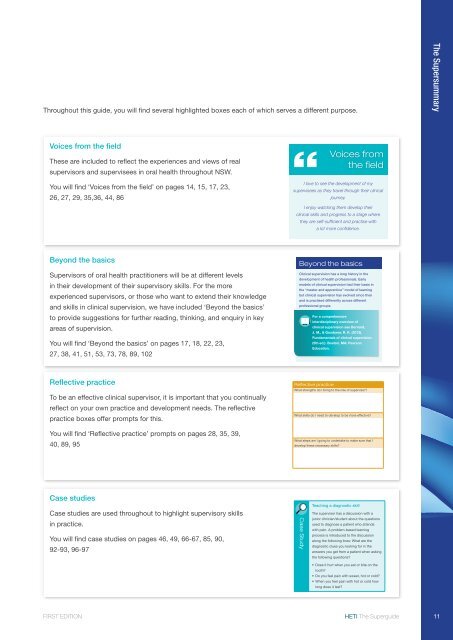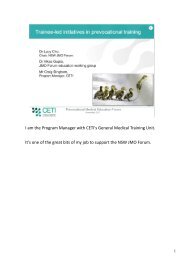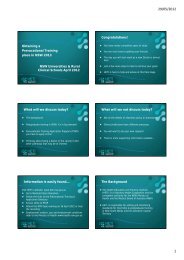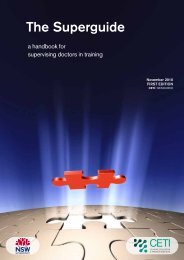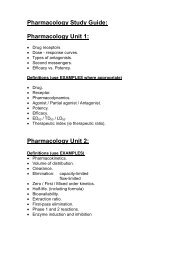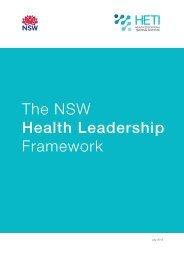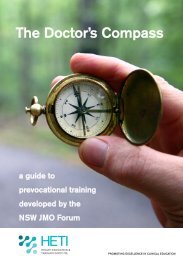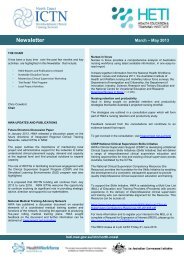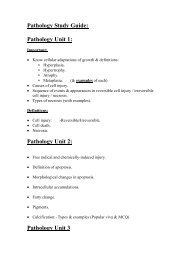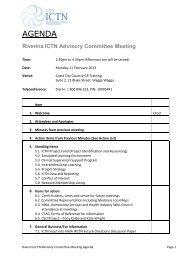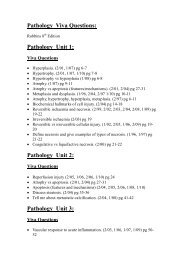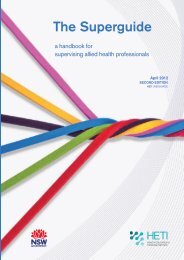Open - HETI - NSW Government
Open - HETI - NSW Government
Open - HETI - NSW Government
- No tags were found...
Create successful ePaper yourself
Turn your PDF publications into a flip-book with our unique Google optimized e-Paper software.
Throughout this guide, you will find several highlighted boxes each of which serves a different purpose.The SupersummaryVoices from the fieldThese are included to reflect the experiences and views of realsupervisors and supervisees in oral health throughout <strong>NSW</strong>.You will find ‘Voices from the field’ on pages 14, 15, 17, 23,26, 27, 29, 35,36, 44, 86Voices fromthe fieldI love to see the development of mysupervisees as they travel through their clinicaljourney.I enjoy watching them develop theirclinical skills and progress to a stage wherethey are self-suffi cient and practise witha lot more confi dence.Beyond the basicsSupervisors of oral health practitioners will be at different levelsin their development of their supervisory skills. For the moreexperienced supervisors, or those who want to extend their knowledgeand skills in clinical supervision, we have included ‘Beyond the basics’to provide suggestions for further reading, thinking, and enquiry in keyareas of supervision.You will find ‘Beyond the basics’ on pages 17, 18, 22, 23,27, 38, 41, 51, 53, 73, 78, 89, 102Beyond the basicsClinical supervision has a long history in thedevelopment of health professionals. Earlymodels of clinical supervision had their basis inthe “master and apprentice” model of learningbut clinical supervision has evolved since thenand is practised differently across differentprofessional groups.For a comprehensiveinterdisciplinary overview ofclinical supervision see Bernard,J. M., & Goodyear, R. K. (2013).Fundamentals of clinical supervision(5th ed.). Boston, MA: PearsonEducation.Reflective practiceTo be an effective clinical supervisor, it is important that you continuallyreflect on your own practice and development needs. The reflectivepractice boxes offer prompts for this.Reflective practiceWhat strengths do I bring to the role of supervisor?What skills do I need to develop to be more effective?You will find ‘Reflective practice’ prompts on pages 28, 35, 39,40, 89, 95What steps am I going to undertake to make sure that Idevelop these necessary skills?Case studiesCase studies are used throughout to highlight supervisory skillsin practice.You will find case studies on pages 46, 49, 66-67, 85, 90,92-93, 96-97Teaching a diagnostic skillThe supervisor has a discussion with ajunior clinician/student about the questionsused to diagnose a patient who attendswith pain. A problem-based learningprocess is introduced to the discussionalong the following lines: What are thediagnostic clues you looking for in theanswers you get from a patient when askingthe following questions?• Does it hurt when you eat or bite on thetooth?• Do you feel pain with sweet, hot or cold?• When you feel pain with hot or cold howlong does it last?FIRST EDITION<strong>HETI</strong> The Superguide11


